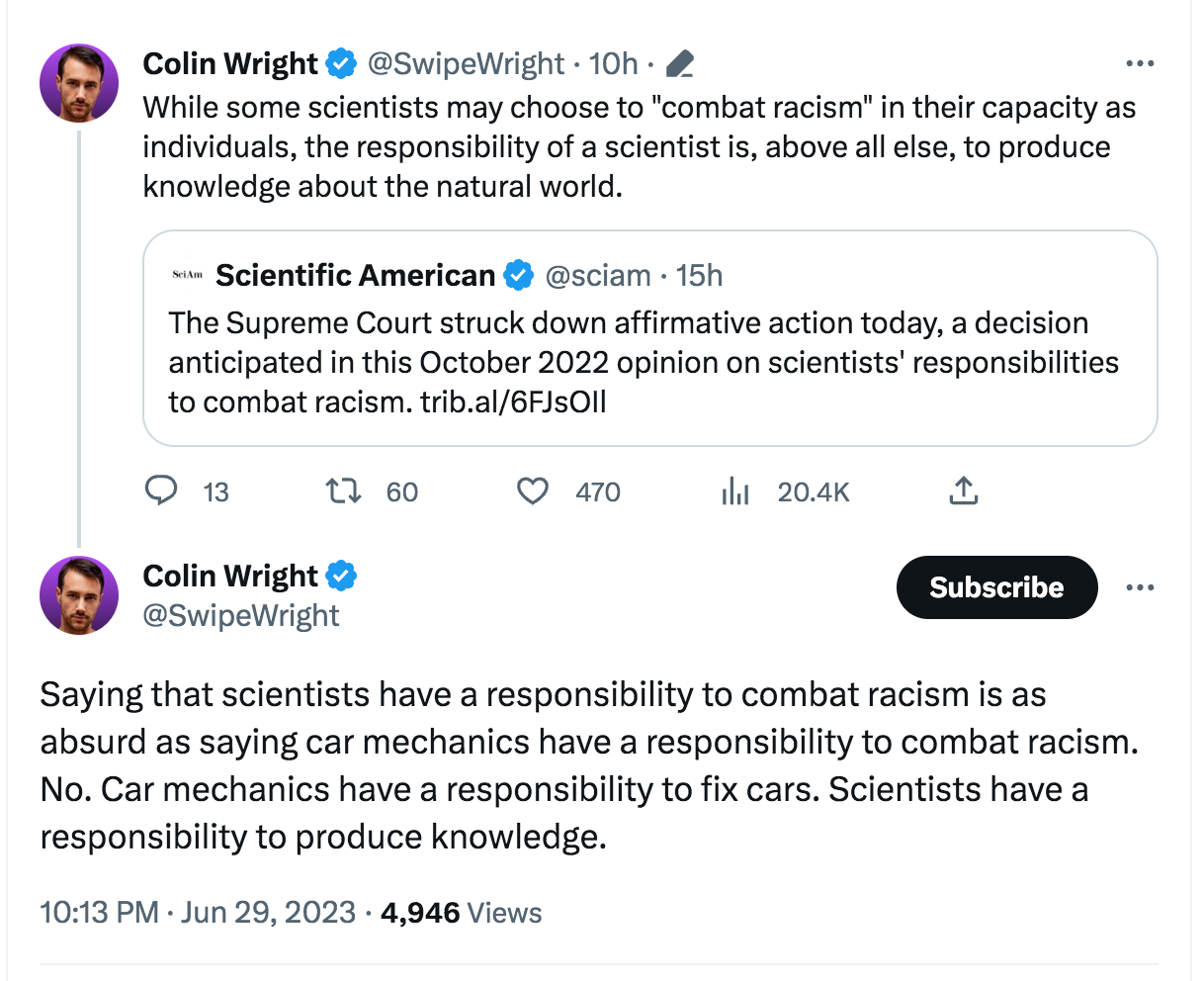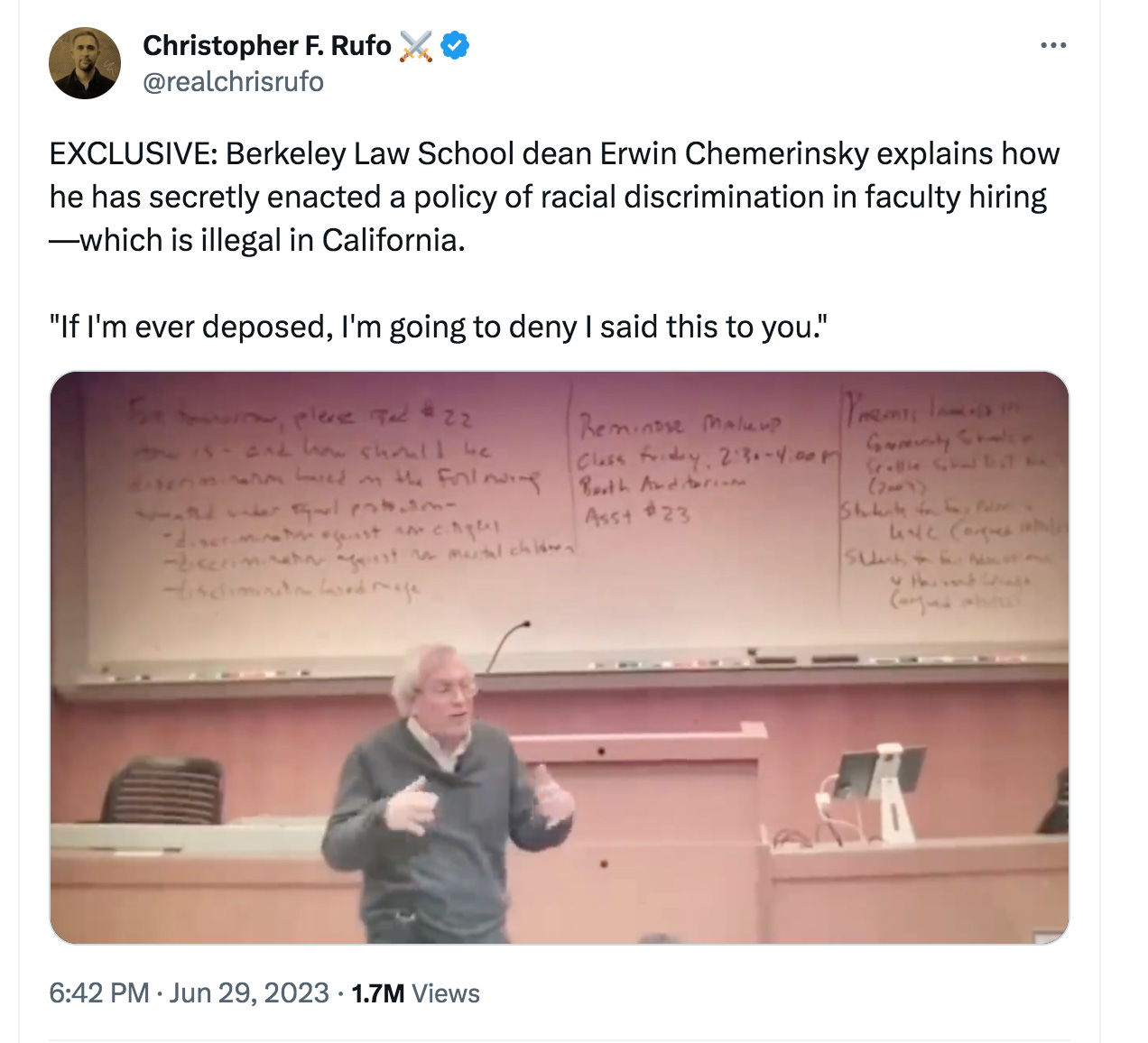E-Pluribus | June 30, 2023
The fight for the right kind of diversity; medical education is sick; and how social media can feed our worst impulses.
Note: E-Pluribus will be on hiatus in observance of Independence Day. We will resume on Wednesday, July 5.
A round-up of the latest and best writing and musings on the rise of illiberalism in the public discourse:
Patrice Onwuka: Fighting for Viewpoint Diversity One Commencement Address at a Time
Let’s face it, most commencement addresses are forgettable (even in this essay, the writer says “While I don't recall the specifics of her speech…”). However, such addresses and who gives them can be a good proxy for attitudes regarding free speech and expression. At Real Clear Education, Patrice Onwuka writes of the importance of honest and open debate and expression and the willingness to agree to disagree.
Many students fear expressing their views to their peers and professors. A significant majority of students and educators engage in self-censorship to avoid the potential repercussions of expressing "wrong" opinions. According to a 2021 survey conducted by the Foundation for Individual Rights in Education (FIRE), RealClearEducation, and College Pulse, which involved 37,000 college students from 159 universities, over 80% of students report self-censoring their viewpoints at least some of the time. Given that some colleges monitor students' social media and take disciplinary action, it is understandable why students choose to remain silent.
Self-censorship is detrimental. It undermines the fundamental mission of academia, viewpoint diversity, academic research, and even scientific research. If students spend four years silencing themselves, how can we expect them to engage in enriching political debates or handle challenging conversations in their future workplaces?
[ . . . ]
Beyond restoring free speech on college campuses, American society must embrace viewpoint diversity as part of the broader conversation on diversity. True diversity encompasses more than just demographic differences, which receive the most attention today. Each individual is more than his or her skin color, ethnicity, gender, sexual orientation, native language, or country of origin. People are complex beings with a myriad of lived experiences, beliefs, backgrounds, values, and viewpoints that challenge the stereotypes associated with their demographic group.
Read the whole thing.
Stanley Goldfarb: Medical Education Is Infected with DEI
Stanley Goldfarb’s troubles in the medical and educational communities began in 2017 as the diversity, equity, and inclusion juggernaut gained momentum. At Minding the Campus, Goldfarb now writes of his most recent experience with a medical reference publication that demonstrates the battle is far from over.
For daring to criticize the spread of social justice in medical curricula, I was roundly condemned by my fellow physicians and medical educators. They took to social media in droves to accuse me of perpetuating racism, white supremacy, and every other evil known to humanity. At first, I thought nothing would come of the attacks, since they were largely contained to Twitter and Facebook. Alas, what happens on social media doesn’t stay there.
In short order, over 150 Perelman alumni signed an open letter condemning me. Colleagues of decades would no longer speak to me. When I’d walk by in the halls, conversations would stop. The reaction overshadowed my long-planned retirement, but the attacks didn’t stop when I finally left in 2021. My name was subsequently scrubbed from the university’s website. I’ve also been excised from its history of the kidney division, despite being a co-director of the division for several years.
It quickly became apparent that my beloved medical profession, to which I had devoted more than 50 years, was spiraling downward even faster than I had realized. The COVID-19 pandemic accelerated the decline, as did the death of George Floyd in 2020. Suddenly, medical schools were loudly proclaiming that health care is “systemically racist,” that “medical reparations” are urgently needed, and that medical education and practice must fundamentally change. Whereas DEI and social justice were frequently discussed in 2018, by the end of 2020 they were the central facets of medical education, where they remain to this day.
Read it all here.
Andrey Mir: The Viral Inquisitor
At City Journal, Andrey Mir chronicles the way the internet and more specifically social media influence how information is evaluated and dispersed, personifying the process as the “Viral Editor.” However, Mir is more concerned about the ongoing transition of that editor into the “Viral Inquisitor,” a capricious and ruthless judge of value, newsworthiness and even truth itself.
The shift from the blogosphere to social media transformed the way people exchange information online. The transition was not only from Blogger and LiveJournal to Facebook and Twitter but also from the written word to digital speech.
At the most fundamental level, blogs are written text. A blog post is a personal diary entry, and writing one takes time. As the Soviet paleoanthropologist Boris Porshnev once noted, thought and speech require the inhibition of natural reflexes. The need to formulate thoughts and sentences mediates our gut reactions. This makes humans slowpokes compared with animals, but it also facilitates deliberation and cooperation, conferring evolutionary benefits. Writing is the highest form of this reaction delay: a literate culture may delay its response to events for days, months, or years, but the deliberation and cooperation that literacy engenders allowed humans as a species to thrive and transform the planet.
Social media have reversed this process. Seeking to extract more of their users’ time and engagement, social-media platforms have made digital reactions almost as instantaneous as physiological reflexes. The Internet completed the transfer of our reactions into virtual space, reducing the transaction costs for sharing them with others. (See “The Medium Is the Menace,” Winter 2022.)
Global cooperation of humans was an effect of literacy because literacy allowed us to communicate over time and space. But shouldn’t social media make society even more cooperative? After all, people can now get more responses to one another’s thoughts than ever before. But the nature of cooperation has changed dramatically. Lacking the deliberative element that writing requires, social-media posts often feature nothing but gut, emotive reactions.
The response of others is a currency needed to gain and maintain social status. Social media automatized response through the buttons of “like” and “share” and thus drastically reduced the effort needed to gain or give a response. The exchange of responses accelerated and made it possible to get a response with almost no content production (by posting a selfie, say). Increasingly, what the Viral Editor now selects and delivers to users is not content but other users.
Read it all.
Around Twitter
Colin Wright takes issue with Scientific American’s assertion that scientists have “responsibilities to combat racism”:
Via Free Black THought, here’s Coleman Hughes with 10 points on the end of affirmative action:
And finally, Berkeley Law School dean Erwin Chemerinsky, in a father Berenstain Bears moment, tells an audience of his future plans to lie in a deposition (click for video):









